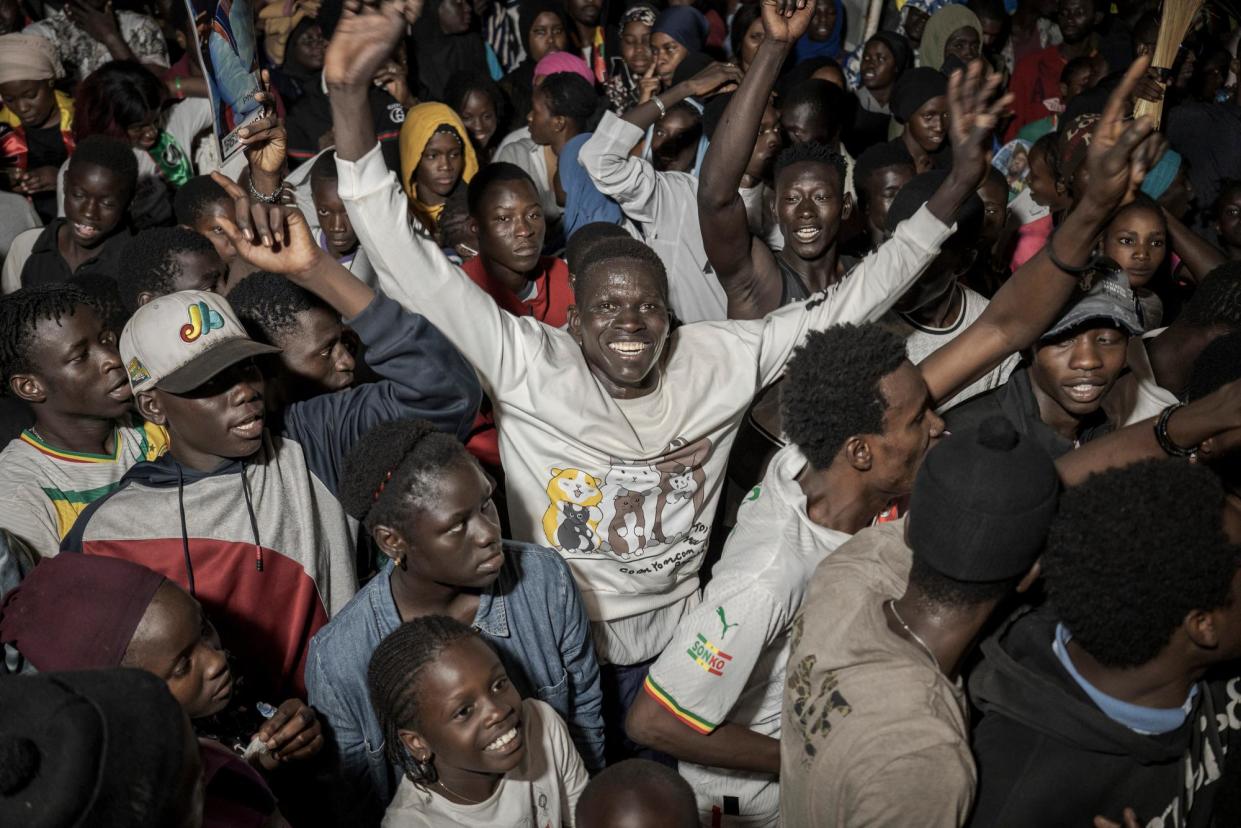‘We are finally free’: Senegal hails new anti-establishment president

Just 10 days before being elected president of Senegal, Bassirou Diomaye Faye was in prison.
Years of political turmoil have left the west African state’s democracy teetering on the brink of collapse, with deadly uprisings and the jailing of opposition figurescommonplace.
But Faye’s victory, secured in the first round of voting, has left the population, particularly its youth, feeling energised by the his promise of radical change.
“I feel free. We are finally free. Senegal is free,” said Elhadji Thiam, 27, a merchant and staunch supporter of the Patriots of Senegal (Pastef), Faye’s anti-establishment party, which was banned in July.
Faye, a former tax inspector, pitched himself as a pan-Africanist intent on steering Senegal toward economic sovereignty and away from French colonial relics such as the west African CFA franc, a currency pegged to the euro.
He has also pledged to overhaul the government, weed out corruption and increase transparency. At 44, Senegal’s youth regard him as a relatable figure whose values have been informed by a traditional village upbringing and a devotion to Islam.
His main rival, the governing coalition’s Amadou Ba, conceded defeat after failing to woo voters on a promise of continuing the status quo. It was the first time since Senegal’s independence from France in 1960 that an opposition candidate won in the presidential election’s first round.
A smooth election is particularly notable for Senegal, a nation on the peripheries of west Africa’s “coup belt.” Neighbours such as Mali, Burkina Faso and Niger have experienced a series of military takeovers that have highlighted the precarity of democracy in the region and raised fears Senegal could follow suit.
Faye was not his party’s first choice of candidate. He was selected to run in place of the former presidential hopeful Ousmane Sonko, who was barred from running due to a defamation conviction – charges his supporters say were politically motivated. Sonko captivated Senegal’s youth with his sharp critiques of political elites and achieved a martyr-like status for serving prison time over a myriad of charges.
Thiam said: “When you see someone who’s willing to give their life for their country it’s impossible not to support them. Sonko has done everything for Senegal.”
His popularity was transferred on to Faye with the help of Sonko’s wholehearted endorsement as well as through the oft-recited party slogan: “Sonko is Diomaye, Diomaye is Sonko.”
Critics of Pastef have condemned the party for promoting what they say are reckless policies that could sink Senegal’s economy, most notably its budding oil and gas industry, and inciting “insurrectional movements”.
Faye will serve as Senegal’s fifth democratically elected president, replacing Macky Sall , who has been in power since 2012. Sall has also been criticised for prioritising foreign interests and businesses over local entities, and opponents blame him for high youth unemployment rates and a related migration crisis, which has reached record highs in recent years. More than 60% of Senegal’s population is under the age of 25.
Sall’s popularity among Senegalese youth sunk to new lows during his second term when he began jailing opposition members. His ambiguous stance about whether he would step down at the end of his mandate fuelled violent clashes between protesters and gendarmes. More than 60 people have died in protests since 2021, according to rights groups.
Moussa Sarr is a lawyer whose clients include Faye and Sonko as well as other jailed politicians, journalists and activist. He said: “Over the last three years, Senegal has witnessed a massive retreat of democratic norms.” The people he represents, Sarr said, have one thing in common: “They’ve taken positions that are discordant with the state. And the state tried to muzzle them by arresting them.”
Protests were reignited in early February when Sall suddenly announced that the elections, originally scheduled for 25 February, would be postponed by 10 months. The delay, he claimed, was needed in order to investigate alleged corruption within Senegal’s constitutional council. Critics called it a constitutional coup.
As Senegal’s parliament was set to vote on the matter, security forces stormed the national assembly and threw out opposition lawmakers.
International pressure mounted and Senegal’s constitutional court intervened. Sall reversed course and shortened the delay to one month. An amnesty law was passed and thousands of political prisoners were released.
Election day was largely peaceful and Faye’s opponents, namely Ba and Sall, were quick to concede.
Lamine Sane, an electoral operations manager with Pastef, said: “We’ve lived through some of the darkest moments in this country’s history. We were attacked from all sides. Our political party was dissolved, our leader was imprisoned, hundreds of young people were killed for simply demanding good governance.”
“Despite everything, we remained resilient,” he added. “And now we have a heavy responsibility to bring this country back to democracy.”
Shortly after the polls closed on Sunday, vote counts began trickling in. The results were clear: a landslide victory for Faye. Thousands of people flooded the streets to celebrate. Children cheered from atop their parents’ shoulders while others hung from car windows, flags draped around their shoulders, yelling: “We’re free! Senegal is free!” Outside Pastef headquarters, people danced with brooms to symbolise the sweeping away of corruption. Some crowded around passing cars, using posters of Diomaye to wipe away the dirt.
“Democracy has never been served to us on a silver platter. It’s always been a hard fight,” said Hawa Ba, the head of the Senegal office of the Open Society Initiative for West Africa. “We were again put to the test and our resilience paid off.”
“There’s still a lot to do,” she said, “but at the end of the day, the Senegalese people won. Change happened.”


